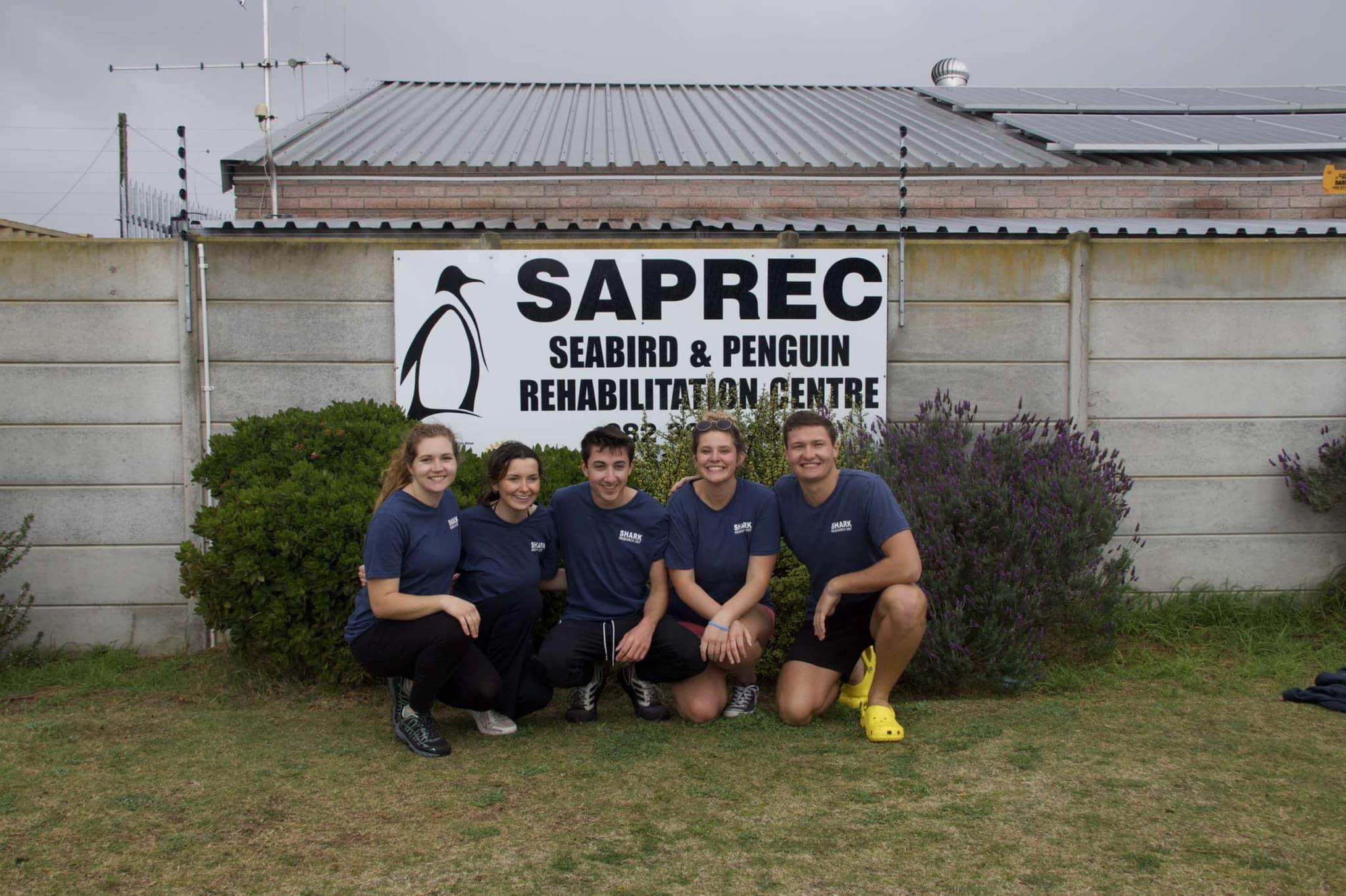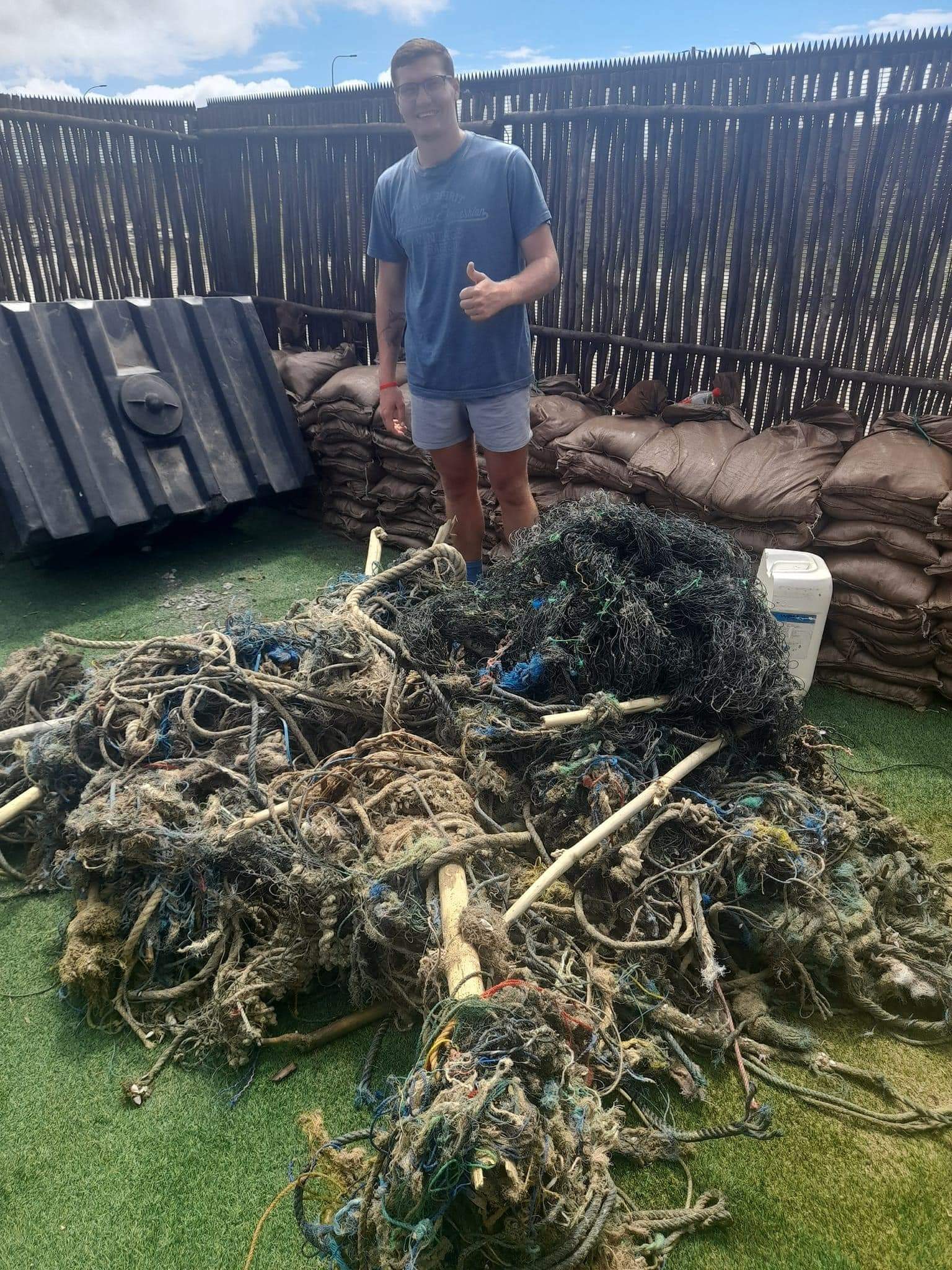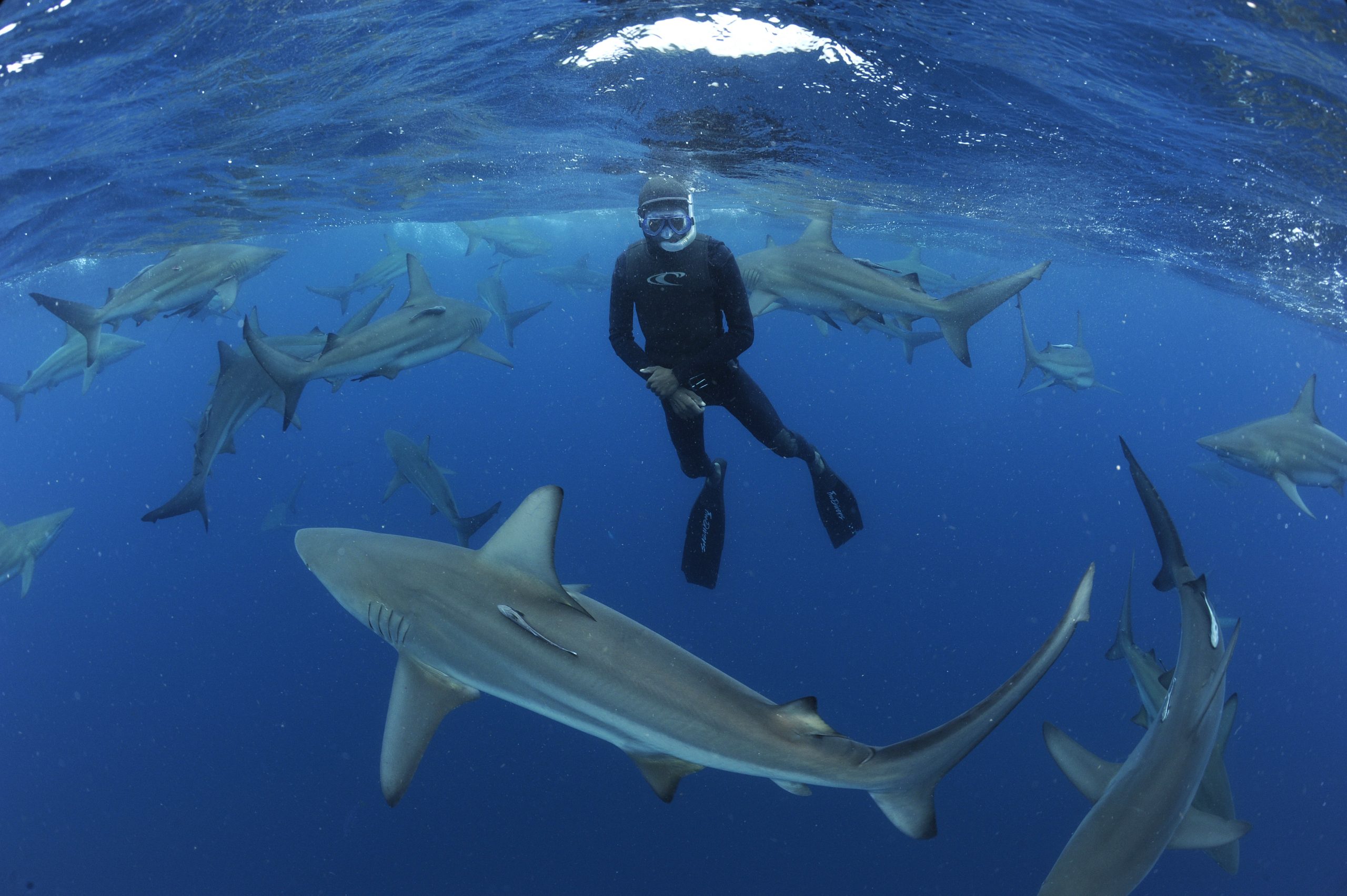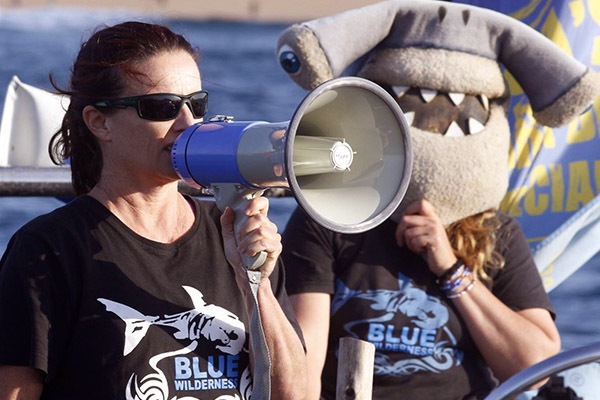Research Scientist, Jessica Escobar Ph.D. campaigns for shark conservation by exposing the impact of bather protection nets on the sharks of kwaZulu Natal
Research Scientist, Jessica Escobar Ph.D. campaigns for shark conservation by exposing the impact of bather protection nets on the sharks of kwaZulu Natal
Sharks are being fished out
Lack of proper management and overuse have left some shark species in decline, with some near extinction. According to reports, shark catch is up to the alarming annual figure of 273 million worldwide. Some experts predict that if the killing continues at the current rate, many species will be lost forever, with potentially devastating implications for our ocean ecosystems.
Sharks keep oceans healthy & productive
Sharks have evolved in a tight inter-dependency with their ecosystem. They tend to eat very efficiently, going after the old, sick, or slower fish in a population, keeping that population healthy. Sharks groom many populations of marine life to the correct size so that those prey species don’t cause harm to the ecosystem by becoming too populous. Intricate food webs make up the ocean ecosystem. For the most part, sharks are at the top of these webs and are considered by scientists to be “keystone” species, meaning that removing them may cause the whole structure to collapse. For this reason, the prospect of a food chain minus its apex predators may mean the end of the line for many more species. Scientific studies demonstrate that depletion of sharks results in the loss of commercially important fish and shellfish species down the food chain, including key fisheries such as tuna and other important fish species that maintain the health of coral reefs.
Killing sharks affects the entire ecosystem
In a study off the east coast of the United States, overfishing virtually eliminated 11 species of shark from their range. Of the 14 species of marine life that those sharks used to eat, the populations of 12 exploded and caused significant damage to the ecosystem. For example, the cow nose ray population was no longer kept under control by sharks and grew out of control. As a result, the rays destroyed the population of bay scallops, their favoured food. The scallop fishery, thriving sustainably for over 100 years, was virtually wiped out, with scallop catch dropping to only 13% of its high point. In addition, the removal of the scallops likely affected water quality as they were no longer there to perform their function of filtering and cleaning the water.
Shark meat is toxic to humans
Heavy metals and other environmental toxins accumulate in plant and animal tissues through the well-documented process of bioaccumulation. Sharks are prone to bioaccumulation through diet (biomagnification) as they incorporate metals very efficiently and eliminate them slowly. Eating shark meat exposes you to these potentially dangerous toxins, particularly high levels of methyl mercury. While a certain amount of mercury in the environment is natural, increasing pollution maximises the risk of high mercury levels in the fish we eat, mainly fish at the top of the food chain like sharks. Consuming sharks will increase the level of mercury you ingest, which will, in turn, increase your risk of neurological disorders, autism, infertility, Coronary heart disease or even death.
Sharks are worth more alive than dead
While a considerable demand for shark fins in Asia results in the slaughter of hundreds of millions of sharks annually, a study found that sharks are worth far more alive than dead. In Palau, where more than half of tourists partake in diving excursions, each reef shark brings in about $179,000 in tourism revenue annually, or about $1.9 million during its lifetime. By comparison, a single shark’s fin, sold for shark fin soup, fetches only about $108.
Sharks mitigate prey ecosystem impact
Sharks regulate the behaviour of prey species and prevent them from over-grazing vital habitats. Some shark researchers believe that the intimidation factor caused by sharks may impact the ecosystem more than what sharks eat. For example, scientists in Hawaii found that tiger sharks had a positive impact on the health of seagrass beds. Turtles, the tiger sharks’ prey, graze on seagrass. In the absence of tiger sharks, the turtles spent all of their time grazing on the best quality, most nutritious seagrass, and they soon destroyed the habitats. However, when tiger sharks are in the vicinity, turtles graze over a broader area and do not over-graze one region.
Shark health reflects ecosystem health
The loss of sharks from certain areas may indicate an ecosystem out of balance and in trouble. Provided that sharks weren’t fished out of certain areas, it is reasonable to assume that their disappearance would result from the destruction of suitable habitats. The fact that shark species are so diverse and inhabit every ocean on the planet makes them key players essential to the ocean environment. Yet, despite their importance in the marine food chain, they remain a low conservation priority. Sharks are incredibly fragile for all their evolutionary success, and apparent menace, unable to withstand the increased pressures forced on them by the greedy world fishing industries. Sharks are vulnerable because they are slow-growing animals that mature late, live long, and have a low reproduction rate.
The Shark Research Unit conducts and ‘partners in’ local and national conservation campaigns. Our campaigns are aimed at ensuring the long term survival of sharks and the marine environment.

Fridays are dedicated to conservation efforts in and around Mossel Bay, and the team generously donates their time to help. Their activities often involve volunteering at SAPREC, where they assist with feeding, cleaning, and caring for penguins and other injured marine birds. Additionally, students and researchers collaborate with other NGOs and schools in the area to raise awareness about ocean conservation. It’s inspiring to see such a committed team working to improve the welfare of animals and promote environmental conservation.
The Shark Research Team is committed to promoting beach clean-ups in and around Mossel Bay. We understand that litter and plastic pollution can have a devastating impact on marine life, including sharks. By organizing beach clean-ups and educating the public about the importance of proper waste management, the team is helping to protect the local environment and the animals that call it home.
Through these efforts, we are building a stronger connection between the scientific community and the public, creating a sense of ownership and stewardship over the local marine ecosystem. By working together, we hope to promote the long-term health and sustainability of the ocean and its inhabitants.

For SCUBA divers and freedivers, encountering the invasive presence of fishing lines, sinkers, netting, and other human-made fishing debris is an all-too-common occurrence. This can have a significant impact on the marine ecosystem, as it can entangle or harm marine life. To combat this issue, the Shark Research Unit conducts monthly reef cleanups, utilizing our SCUBA diving abilities and specialized facilities.
Equipped with knives and bags, we actively remove fishing tackle and other debris from our local reefs, reducing the risk of entanglement and injury to marine life. By taking an active role in cleaning up our underwater environment, we hope to raise awareness about the importance of responsible fishing practices and proper disposal of fishing debris.
Through our efforts, we are working to protect the marine ecosystem and promote sustainable fishing practices. Our monthly reef cleanups serve as a reminder of the impact that human activities can have on the underwater environment, and the importance of taking responsibility for our actions.

The Shark Research Unit is actively involved in the ELMO AFRICA project, a citizen science initiative focused on collecting data on South African shark, ray, and skate populations. As part of this project, we collect information on elasmobranch eggs that wash up on Mossel Bay beaches, contributing to a central database that is used to inform conservation efforts.
By collecting and submitting data to the ELMO AFRICA project, we are helping to build a more comprehensive understanding of elasmobranch populations in South Africa. This information can be used by scientists, politicians, and stakeholders to make informed decisions about conservation efforts, ultimately helping to protect these vulnerable species.
Through our involvement with the ELMO AFRICA project, we are contributing to a larger effort to promote citizen science and engage the public in conservation efforts. We believe that this type of collaboration between scientists and the public is key to promoting a more sustainable and responsible approach to environmental conservation.

Help us achive our shark research and conservation goals through becoming a pateron of the Shark Research Unit

Adopt and name one of our resident sharks. Receive annual updates on its sightings, growh, health and movements.

Searching for a passionate and motivated team to assist you with your local shark or marine conservation campaign. Reach out to the SRU
Ensure your local fish and chip shop is not serving shark disguised as fish (e.g. flake)
Eat and purchase only sustainably sourced seafood. Look for the MSC or SASSI certification.
Boycott restaurants that serve sharks and let the manager know why.
Avoid buying items or products that contain ‘Squaline’. This is shark liver oil.
Support Shark ecotourism and go shark diving. Make sharks a LIVING asset.
Petition government on local shark issues. Be the voice for sharks.
Donate and Volunteer with Shark Conservation Organizations
Stop the ratings. Boycott ‘shark attack’ style documentaries that create fear
The Shark Research Unit is a shark and marine research and conservation institute driven by a passionate team of shark experts. We are located in South Africa and work in two regions of priority – Aliwal Shoal and Mossel Bay.
Our core purpose is to conduct and support original shark research, conservation and education programs through strategic partnerships with marine scientists, postgraduate students, ecotourism operators and academic institutes.
Our focus extends to nurturing a new generation (of all ages) of shark scientists, professionals and enthusiasts. We achieve this through our great white shark research internship, learner outreach programs and expert guided shark edu-tours
MOSSEL BAY CENTER
ALIWAL SHOAL CENTRE